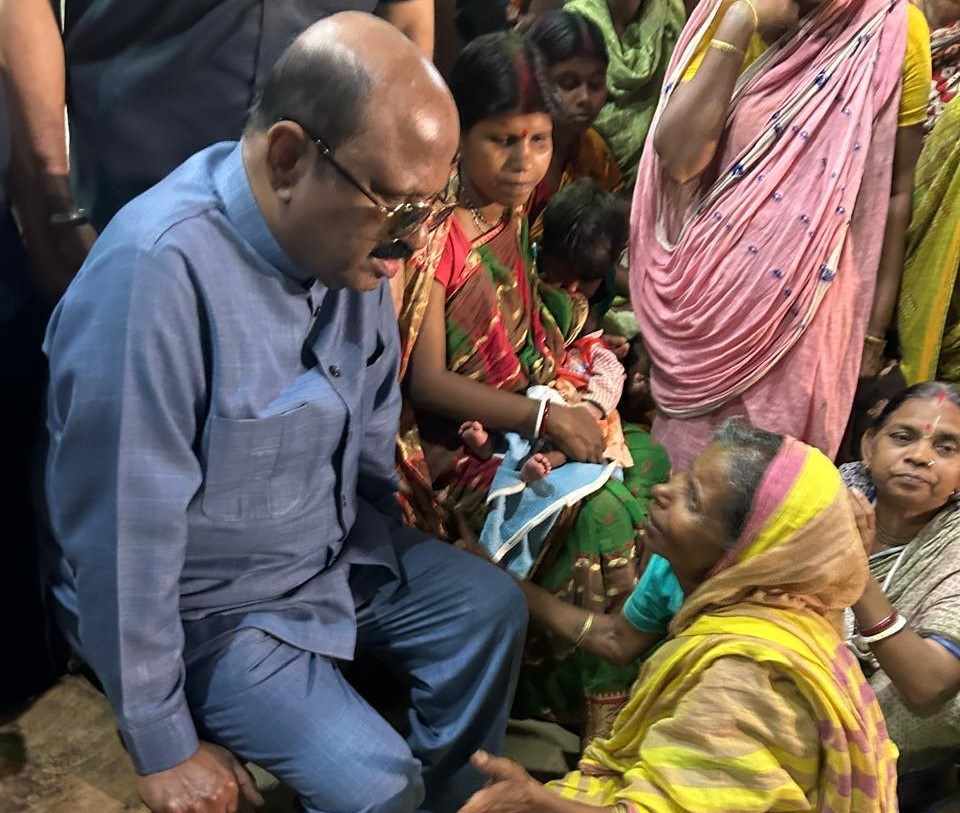West Bengal Governor Dr CV Ananda Bose on Friday defied Chief Minister Mamata Banerjee’s request to avoid visiting the violence-affected regions of Murshidabad, choosing instead to directly interact with victims of recent clashes in Jangipur and Dhulian.
First-Hand Interaction With Displaced Families
Dr Bose took a train to Malda in the morning and proceeded to Parlalpur High School, where nearly 400 families displaced by the April 11 violence in Suti and Samserganj have taken refuge. Speaking after his visit, the Governor said, “I met the homeless people at the camp. They are still scared and have requested permanent protection from the Border Security Force. They were assaulted and now seek justice. Peace and harmony must be restored in these areas.”
He further added, “This kind of violence and unrest is never acceptable. Ground-level efforts to restore normalcy are already underway.”
The Governor is scheduled to visit the worst-affected areas of Murshidabad on Saturday.
A day prior to the Governor’s visit, Chief Minister Mamata Banerjee had urged restraint, cautioning that high-profile visits to the disturbed area might disrupt ongoing peace efforts. “I appeal to all not to visit Murshidabad now. If I go, others will follow, and this could disturb the peace-building process,” she said.
NHRC Team Assesses Human Rights Situation
Meanwhile, multiple central agencies have stepped in to assess the situation. A three-member team from the National Human Rights Commission (NHRC) arrived at Malda station via the Vande Bharat Express on Friday morning. They spent considerable time at the Parlalpur relief camp, listening to victims’ testimonies and documenting their accounts of violence, displacement, and ongoing hardship. Though the team declined to speak to the media, it is expected to submit a detailed report to NHRC headquarters in Delhi.
Tensions briefly escalated after the NHRC team left, as displaced residents accused the police of restricting their movement and barring relatives from visiting the camp.
NCW Probes Alleged Violence Against Women
In parallel, a six-member delegation from the National Commission for Women (NCW), led by Chairperson Vijaya Rahatkar, also visited the Parlalpur camp. The team, which had reached Kolkata on Thursday and traveled to Malda via Berhampore, was responding to reports of violence and alleged atrocities against women during the clashes.
Speaking to the media, NCW member Dr Archana Majumdar accused local police of attempting to disperse the camp before the commission’s visit. “Had intelligence worked in time, this situation could have been avoided,” she remarked. The NCW team assured the displaced families of support and justice, and plans to meet with police and district officials to ensure their safety.
Chairperson Rahatkar said, “We have spoken to the victims and will be visiting the affected areas. Our team will also meet the Governor on Sunday and submit a comprehensive report to the Centre.”
State police sources claim that the situation in Murshidabad is slowly returning to normal, with 70% of local businesses reopening and at least 85 displaced people returning home. However, many others remain in relief camps or have migrated to neighbouring Jharkhand’s Pakur district.
Governor Bose reiterated Raj Bhavan’s commitment to assisting victims. “We will do everything possible in collaboration with both the state and central governments. I am visiting these areas to gain an objective understanding of the situation and ensure preventive steps are taken to avoid such violence in the future,” he stated.
With both NHRC and NCW expected to submit their findings to the Centre in the coming days, the focus now shifts to how authorities will respond to the reports and address the long-term rehabilitation of the displaced families.


